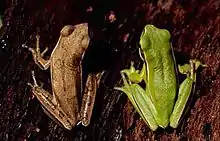Montevideo tree frog
The Montevideo tree frog (Boana pulchella) is a species of frog in the family Hylidae found in eastern, central, and northern Argentina, south-eastern Brazil, south-eastern Paraguay, and Uruguay.[2] It is a common species occurring in open habitats in forests, grasslands, and flooded savannas. Breeding takes place in permanent ponds and flooded grasslands.[1]
| Montevideo tree frog | |
|---|---|
 | |
| Scientific classification | |
| Kingdom: | Animalia |
| Phylum: | Chordata |
| Class: | Amphibia |
| Order: | Anura |
| Family: | Hylidae |
| Genus: | Boana |
| Species: | B. pulchella |
| Binomial name | |
| Boana pulchella | |
| Synonyms | |
| |
The diet of Argentinean Boana pulchella was found to consist mostly of spiders, dipterans and, crickets. During the cold time of the year, these frogs continue to feed at high rate, instead of partly relying on their fat reserves as the sympatric Dendropsophus nanus do.[3]
References
- Axel Kwet; Lucy Aquino; Esteban Lavilla; Ismael di Tada (2004). "Hypsiboas pulchellus". IUCN Red List of Threatened Species. 2004: e.T55619A11340514. doi:10.2305/IUCN.UK.2004.RLTS.T55619A11340514.en.
- Frost, Darrel R. (2014). "Hypsiboas pulchellus (Duméril and Bibron, 1841)". Amphibian Species of the World: an Online Reference. Version 6.0. American Museum of Natural History. Retrieved 24 June 2014.
- Antoniazzi, Carolina Elizabet; Javier Alejandro López; Marta Duré; Diego Alejandro Falico (2013). "Alimentación de dos especies de anfibios (Anura: Hylidae) en la estación de bajas temperaturas y su relación con la acumulación de energía en Santa Fe, Argentina (Feeding of two amphibian species (Anura: Hylidae) during the low temperatures season and its relationship with energy storage in Santa Fe, Argentina)". Revista de Biología Tropical. 61 (2): 875–886.
This article is issued from Wikipedia. The text is licensed under Creative Commons - Attribution - Sharealike. Additional terms may apply for the media files.
